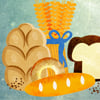Question:
This question comes up in my house every year: Which vegetables can be eaten on Passover?
My mother only used vegetables that grew under the ground, but my father's family eats all sorts of vegetables. Please help us do the right thing!
Answer:
It is always important to differentiate between the law, and family and communal traditions and customs. This is especially true regarding Passover, when such customs and traditions abound.
Forbidden on Passover are: wheat, barley, oat, spelt or rye flour which have come in contact with water or moisture, and were not fully baked within eighteen minutes from the moment of contact.
(In addition, the mediaeval Ashkenazi sages banned the eating of legumes, such as corn and rice, on Passover, because their textures are similar to the five abovementioned grains. These are known as kitniyot. If you are Sephardic, contact the rabbi of your community to find out the custom which your particular community follows with regard to kitniyot.)
Anything else may be eaten on Passover.
Practically however, in order to be certain that no chametz has been mixed in to a particular food item, as well as to ensure that it wasn't processed using the same utensils as chametz foods, we only eat foods with a reliable Kosher for Passover certification.
Fresh, unprocessed fruits and vegetables, however, do not require certification.
Now let's move on to some of the customs and traditions in this area:
Some have the custom to peel all the fruits and vegetables that they eat on Passover, out of concern that the skin may have come in contact with chametz. Produce which cannot be peeled, such as berries or peppers, are not eaten by these people.
There are also a few vegetables — such as garlic, ginger, and radish — which certain communities don't eat for various reasons. Inquire of your parents and/or your rabbi for specifics regarding the custom of your particular ancestors.
I am not aware of any custom which only permits eating vegetables which grow beneath the ground.
I hope this helps.
Have a Happy and Kosher Passover!
Rabbi Baruch S. Davidson







Join the Discussion